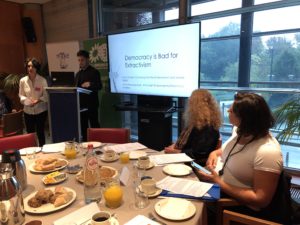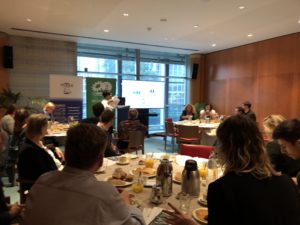EUROPEAN PARLIAMENT ‘MAKE ICT FAIR’ BREAKFAST RAISES AWARENESS OF HUMAN RIGHTS VIOLATIONS IN ICT SUPPLY CHAINS
On the morning of the 1st October, the Make ICT Fair consortium held a breakfast event at the European Parliament in Brussels attended by around thirty participants. The event was hosted by Austrian MEP Monika Vana of the Greens/EFA and Swedish MEP Abir Al-Sahlani of Renew Europe in the Members Salon of the Parliament.
The breakfast was organised to raise awareness of sustainability and human rights abuses in the supply chain of information communication technology (ICT) products, as well as facilitate the discussion on the role of MEPs in promoting EU policies on human rights, European development banks and public procurement.

(From left) Anna Shahnazaryan, Sergi Corbalan, MEP Monika Vana and MEP Abir Al-Sahlani
MEP Abir Al-Sahlani said: “Our societies have benefited greatly from globalisation. But it is important to raise awareness of human rights risks associated with the production of some of the most popular products that many of us enjoy – like smartphones. People should never be in danger when doing their jobs.”
The breakfast began with a video testimonial addressed to MEPs from Pak Kin Wan, a worker in the Labour Education and Service Network in Hong Kong, and a speech by Anna Shahnazaryan who works in the Armenian Environmental Front in Armenia and had experienced first-hand the violations to human rights. Following this, speakers from SETEM, Bankwatch and Südwind gave talks on the priority EU areas of action: business and human rights, European development banks and public procurement.

“The situation of workers in ICT supply chains demands our immediate attention,” said MEP Monika Vana. “Human rights and labour rights are violated every day, alongside severely negative impacts on the environment in many countries. We as politicians have a responsibility and the possibility to act efficiently. It is us who can help to ensure that a legal framework is in place, that guides companies and financial institutions to carry out human rights due diligence before business or financial decisions are taken. We can also make sure that the European Parliament applies the same level of scrutiny towards its own ICT procurement.”
Make ICT Fair participant organisations presented the MEPs with a list of case studies conducted by members of the consortium, as well as a briefing document outlining the key actions MEPs can take to ensure the implementation of fair and sustainable EU policies on the priority areas.
Participants could upload photos and footage using the hashtag #MakeICTFair and #fairelectronics on social media.
For more information contact the Executive Director of the Fair Trade Advocacy Office, Sergi Corbalán, at corbalan@fairtrade-advocacy.org.
Notes
Make ICT Fair is an EU-wide project that aims to improve the lives of workers and communities affected by the production of ICT devices such as smartphones and laptops. We target EU citizens, public procurers, development banks, decision-makers, and companies to improve their purchasing practices and to align policies. The partners: SETEM Catalunya, CATAPA, ICLEI, the University of Edinburgh, Le Monde Diplomatique, People & Planet, CEE Bankwatch, Swedwatch, Electronics Watch, Towards Sustainability Association, and Südwind.